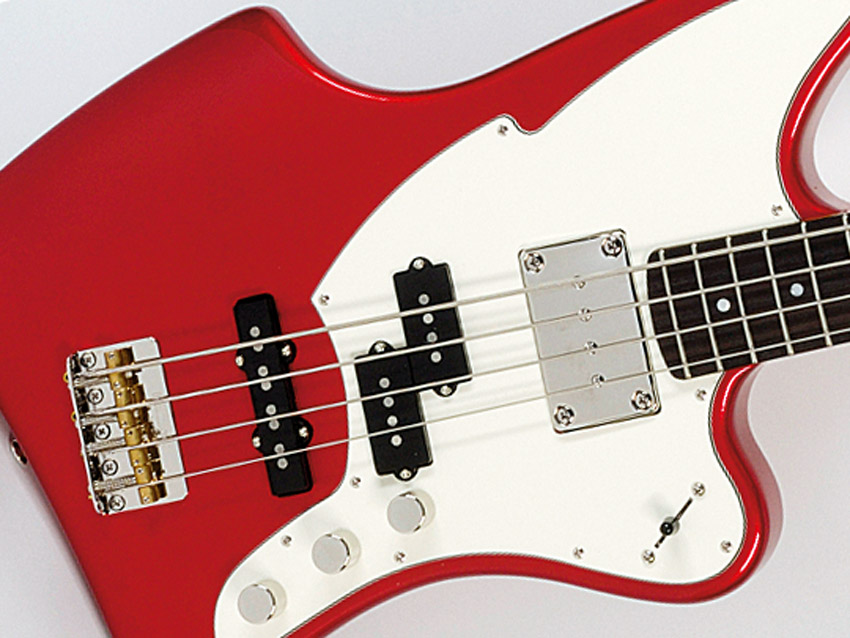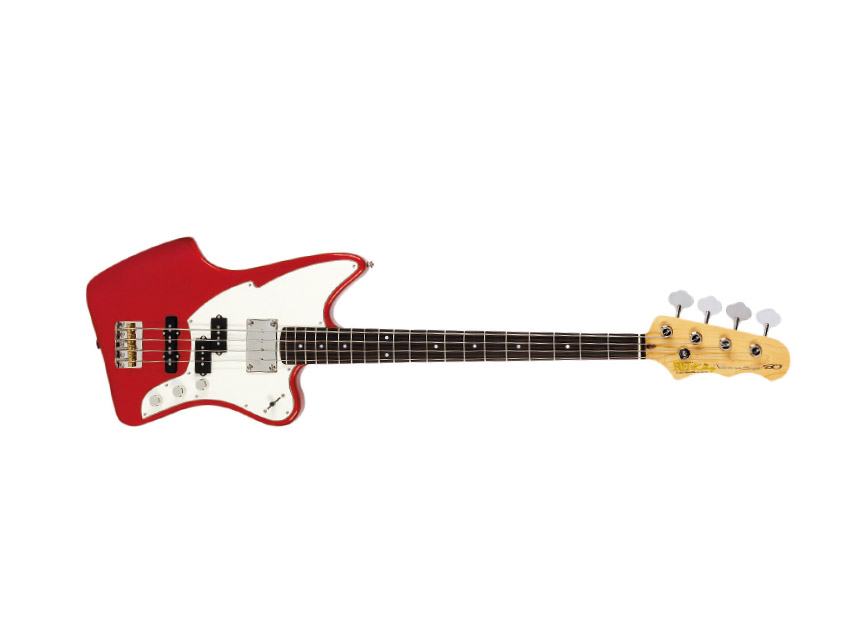MusicRadar Verdict
A great concept, with good build, sounds and value for money.
Pros
- +
Original-yet-classic design. Outrageous pickup arsenal. Versatile sounds.
Cons
- -
Pickup switch.
MusicRadar's got your back

Fret-King Blue Label Ventura Super 80 Bass

Fret-King Blue Label Ventura Super 80 Bass
When it comes to designing something new and innovative but with an air of familiarity, Trev Wilkinson is a master.
His knowledge and expertise, combined with his love of classic guitars and basses, has given the Fret-King range some of the best-looking modern instruments around. But there's always more to be done…
The Blue Label designation means this is a pocket-friendly bass made in the Far East but, as Wilkinson's influence is very much in evidence throughout, it honestly looks and feels more like a home-grown instrument and one that's ideal for our current tight budgets.
The Ventura is another unashamedly Gibson-meets-Fender design (and the 'batwing' headstock means there's a bit of Burns in there too), borrowing from both major camps in body shape, finish and its curious pickup combination.
The semi-reverse body styling helps provide the instrument with better balance, and intelligent contouring positions the bass right into the body. It certainly adds comfort to the player, but it does dictate the playing position.
While many basses boast of having the ability to produce pretty much all of the distinctive bass sounds we know and love, the Ventura probably comes closer to realising this claim without introducing the use of sophisticated onboard active electronics or instrument sound modelling.
Single and split-coil combinations are versatile - as they can produce all of the established Fender bass sounds - but by adding the neck humbucker into the mix you also include all of the fatter sounds associated with Gibson basses. Then by individual blending you can, in theory, produce a host of other established sounds plus several that you've never heard before.
Want all the hottest music and gear news, reviews, deals, features and more, direct to your inbox? Sign up here.
Sounds
Being passive and without any tone control, each pickup is essentially set to full treble. Now this could easily be seen as a problem if it wasn't for that humbucker. This produces so much low-end body and thump that you really don't need any more bottom enhancement here.
So obviously, blending is the name of the game and although the single and split-coils do sound thin in comparison, rest assured each pickup is fully capable of delivering its own unique sound signature with confidence.
Use the five-way slide switch to select each individual pickup or combinations of neck and middle or middle and bridge. Combining reveals the sweet spots, gradually nurtured out by altering the volume of each active unit.
This works well enough, but remember - if you switch to a pickup when its volume is down you get nothing. Each pickup has a naturally distinctive voice so it's this fine blending of the units that allows for definitive tone shaping and the lack of a dedicated tone control proves not to be a problem.
The sounds achieved when working with the single and split-coils are good and honky, but not exceptional. However, we were totally blown away when using the split-coil and the humbucker together: a monstrously huge sound, fat and fruity with lots of sweet spots, that's easy to make dirty too. Gradually backing off the humbucker reveals the hollowest of sounds - it's quite a sonic adventure.
Another winner for the Wilkinson approach of producing instruments that look like they've been around for years until you look again and realise that it's one of his.
On first glance the Ventura may appear to be over-endowed in regard to its pickups, but as soon as you plug it in, it all makes perfect sense. It feels like a Fender, but can sound like a Gibson on steroids. A performance enhancing bass - and legal.